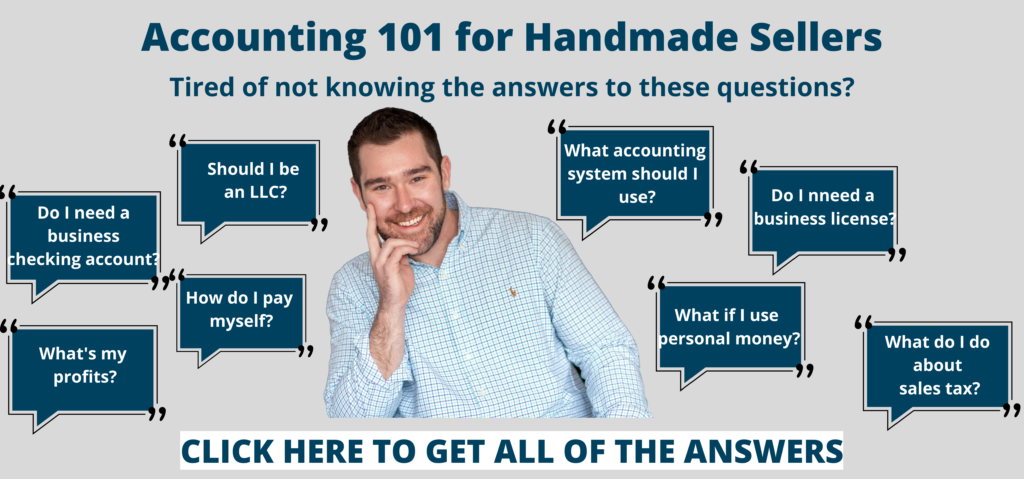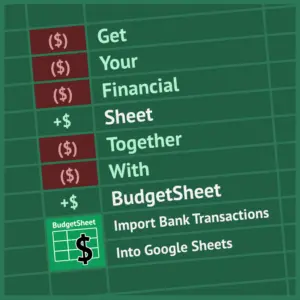* Some articles may contain affiliate links for researched products. There is no extra cost to you and it helps pay for boring stuff like website hosting and plugins.

The Perfect Accounting System
It finally happened. You decided that it was time to start selling your handmade goods on Etsy or your own personal website! Now, before we can get to celebrating, coming down the other side of the highway are all of the things you really wish you knew about sooner…. and then inside you might be thinking ‘Do I need an LLC to sell on Etsy?’….. let’s get to it!
There are many not-fun things about running a business, like paying taxes for your Etsy shop or handmade store, getting licenses and permits, opening up bank accounts, and deciding if you need to be an LLC or not.
In today’s article, I am going to go over some of the most important things that you should do when you start your Etsy Shop or Handmade Store, including going over the major question I always get:
“Should I be an LLC or not?“
Before we get into all of that though, let’s first go over whether or not you are in fact a business at all.

Step 1. Decide if You Are a Business or a Hobby
* Some articles may contain affiliate links for researched products. There is no extra cost to you and it helps pay for boring stuff like website hosting and plugins.
When you first ask yourself “Do I need an LLC to sell on Etsy” you have to think about a couple different things. There are actually two things you can be considered in the eyes of the IRS, one is that you are considered a business and the other is that you are considered a hobby.
You see, there is a MAJOR difference in your tax consequences and your legal requirements depending on if your Etsy shop operates as a business or as a hobby.
So, what is the difference between a hobby and a business?
It all comes down to what expenses and deductions you can take on your taxes. If you operate as a business you can take certain business deductions like travel, office supplies, rent, and advertising. If you are operating as a hobby, you can ONLY deduct the actual materials, or cost of goods sold that you have, AND you can only deduct UP to the amount of income you have. Now in order to operate as a business and take advantage of the extra deductions, you will need to follow some requirements, so let’s go fully into step 1 of the process…
How do you decide if your Etsy shop is a hobby or business?
To figure this out, let’s go over a couple of common scenarios in which you WOULD be considered a business. If ANY of these sounds like you, then you ARE a business and you are NOT a hobby.
- Are you trying to make a profit by starting your Etsy shop? I am sure this is easy to answer. If you answered yes to this, then you are a business and NOT a hobby. Now, and this is important, whether or not you actually MAKE a profit MAKES NO DIFFERENCE, it is what your intention is that matters. If your intent is opening up an Etsy shop for profit, it’s a business, not a hobby.
- The second question to ask yourself is this. Are you actually MAKING a profit from your Etsy store? If you have made a profit in 3 of the last 5 years, meaning that you made more than you spent in 3 of the past 5 years, then you are IN FACT a business and NOT a hobby.
- The third question is this. Is your shop a partnership or LLC? If you’ve formed your Etsy shop as a partnership or LLC, you are 100% a business and NOT a hobby.
Now, these are the 3 easy questions to ask yourself, if you want to make sure you are 100% operating as a business and can take all of your business expenses and deductions let’s go over how the IRS decides if you are a business or a hobby.
According to the IRS, here are the 9 factors for considering this a business and NOT a hobby.
* Some articles may contain affiliate links for researched products. There is no extra cost to you and it helps pay for boring stuff like website hosting and plugins.
- Whether you carry on the activity in a businesslike manner and maintain complete and accurate books and records.
- Whether the time and effort you put into the activity indicate you intend to make it profitable.
- Whether you depend on income from the activity for your livelihood.
- Whether your losses are due to circumstances beyond your control (or are normal in the startup phase of your type of business).
- Whether you change your methods of operation in an attempt to improve profitability.
- Whether you or your advisors have the knowledge needed to carry on the activity as a successful business.
- Whether you were successful in making a profit in similar activities in the past.
- Whether the activity makes a profit in some years and how much profit it makes.
- Whether you can expect to make a future profit from the appreciation of the assets used in the activity
If you answered yes to most of these questions then you are a business and will need to treat it as such when you go to file your taxes. The way you treat a business for tax purposes is fairly straight forward and what you do is take ALL of your income and ALL of your business-related expenses and complete what is called a Schedule C. This Schedule C is what is commonly referred to as the “Profit and Loss from the Business.”
Now, if you answered NO to most of these questions and your intention is NOT to make a profit, then you will be treated as a hobby for tax purposes and how that works is like this:
You will take the total amount of gross receipts you have or total “income” that you have for the year and then you can ONLY deduct the total “Cost of Goods Sold” that you had.
The difference between the “income” and “costs of goods sold” is what will be considered your taxable “hobby income” and this will be reported on Schedule 1, Line 8 of your 1040.
* Some articles may contain affiliate links for researched products. There is no extra cost to you and it helps pay for boring stuff like website hosting and plugins.
Let’s go over a hobby example.
Let’s say you make blankets and you decide that you want to sell some of these “just for fun” AND let’s say that you did not make a profit in 3 of the last 5 years AND let’s say that you do not meet any of the 9 requirements above. If you are following along, this means you are a hobby, right?
So, since we are a hobby, we can only deduct what is called the cost of goods sold.
Now, we know in order to make blankets we need to purchase cotton or fleece, or whatever material or whatever materials you require to make blankets. The materials you purchased to make the blankets are what is considered your cost of goods sold.
The total amount of materials, or cost of goods sold, we purchased to make the blanket is what we can deduct from the total amount of income we had.
>> So, let’s say you made $10,000 selling blankets, and the material used to make the blankets is $4,500. But let’s also say you spent $400 on setting up a website, $250 on office supplies, $500 for studio space, $700 on advertising, and $250 on gas. If you are a hobby, you can ONLY deduct the $4,500 and CAN NOT deduct ANY other expenses.
Now, when you go to fill out your tax form, on Schedule 1, Line 8 on the 1040, you will report $10,000 minus $4,500 or $5,500 of taxable income. You can NOT deduct the website, office supplies, studio space, advertising, or gas as you are NOT a business and these are considered business expenses!
It’s that easy.
If you are a business make sure you follow all 9 of the IRS requirements to “be a business” and make sure you take all of your income and ALL of your business-related expenses and report it on the Schedule C.
Now, at this point in the process, we know how to decide if we are a business or a hobby and we know the tax implications of both.
So, what’s next?
If you are a hobby, there actually is no next step, you can stop reading here and get back to having fun and making your blankets. All you need to do is report the total amount of income minus the total amount of cost of goods and file your taxes.
If however, you realize at this point that you are in fact a business there are still several things we will want to do and the next step in the process is deciding on what kind of business structure we will be.
Step 2. Decide What Kind of Business Structure You Will Be
* Some articles may contain affiliate links for researched products. There is no extra cost to you and it helps pay for boring stuff like website hosting and plugins.
A business structure is the way your business is organized in the eyes of the IRS and in the eyes of the law.
The two most common “structures” for an Etsy shop are: Single Member LLC and a Sole Proprietorship.
A Sole Proprietorship is an entity that is owned and run by one person and in which there is no legal distinction between the owner and the business entity. Meaning, you are the business and the business is you.
A Single Member LLC is a company that becomes its own legal entity. That means its owner is typically not held personally responsible for debts or if legal action is taken against the business.
Let’s go over some of the advantages and disadvantages of both…
Here are the advantages of a Sole Proprietor
- You can do this instantly, without any money, and easily. Boom you’re a sole prop because you said so.
- You really do not report to ANYONE but yourself, no one really knows you exist.
- You do not need to pay unemployment tax.
Here are the disadvantages of a Sole Proprietor
- You have UNLIMITED exposure to liabilities, so if you get sued, YOU are on the hook.
- You cannot SELL the business, because there IS no business.
Here are the advantages of being an LLC in most states
- As long as members do not pierce the corporate veil, they are not personally responsible for debts of the LLC.
- Raising capital or obtaining a loan through the LLC.
- More professional appearance.
Here are the disadvantages of being an LLC in most states
- Some states charge extra fees for operating an LLC, looking at you California.
- Increased paperwork like Articles of Organization or other state or local documents.
- You need to follow strict guidelines as to NOT pierce the corporate veil.
Now, if you noticed, the biggest advantage of being an LLC over a Sole Proprietorship is the amount of exposure you have to litigation friendly customers and the fact that you look more “professional.” The only real difference is that we are not “legally” separated from the business. Now, this can get confusing, and here is how I like to break it down.
To think about it simply, look at it like this; when it comes to deciding on being a Single Member LLC or staying as a Sole Proprietorship, there are two sides. One side is the Tax Side and the other side is the Legal Side.
Let’s go over these two.
The Tax Side
In the eyes of the IRS, it DOES NOT MATTER if you register your Etsy Shop as Single Member LLC or not. If we have not set up an LLC, then we are considered a Sole Proprietorship. A Sole Proprietorship is STILL a business and can STILL take ALL business deductions and expenses. You will be taxed the same exact way whether you decide to form a Single Member LLC or you operate as a sole proprietorship. A sole proprietorship can still do the same things as an LLC for tax purposes. There is actually NO difference AT ALL between a sole proprietor and an LLC. A sole proprietor can still take expenses, can still take deductions, and will actually be required to file the same exact forms (Schedule C) as an LLC.
* Some articles may contain affiliate links for researched products. There is no extra cost to you and it helps pay for boring stuff like website hosting and plugins.
The Legal Side
First, I am not a lawyer. In my opinion, you should CERTAINLY consult with a lawyer. What I am about to say is for informational purposes only and should not be considered legal advice. If you are looking for a more in depth legal discussion, I do recommend reaching out to Brittany Ratelle at Ratelle Law. She has DIY legal resources at creativecontracts.co.
With that said, here is what I believe is an easy explanation. When you set up a Single Member LLC, you set up a corporation and a separate entity from yourself. There is you THE PERSON and there is you THE BUSINESS. They are now two separate entities in the eyes of the law. I know it can be confusing because according to the IRS a Single Member LLC and a Sole Prop are taxed the same, BUT in the eyes of the law, they are separate. If you can think about it like that and that the IRS has one set of eyes and the law has another, then you will understand this concept.
Now, when deciding to be a Single Member LLC, you must do something which is called “protecting the corporate veil.”
A corporate veil is “a legal concept that separates the personality of a corporation from the personalities of its shareholders, and protects them from being personally liable for the company’s debts and other obligations.”
So, in plain English you can understand that this means you are legally “free” from your business.
How does that happen? What does it mean to be legally free from your business?
Let’s go over an example
Let’s say your name is Mary and you sell under Mary, as a single person, a single entity, or as I said above, a sole proprietor. Let’s say you never set up an LLC to establish yourself as a separate entity. And now let’s say I get a faulty product and my head blows up. I know this is very unlikely, but hey, things happen. So now, headless, I want to sue you and I want to sue you for everything you have!
If you never set up a Single Member LLC, I can take everything you have AS A PERSON. I can take your personal house, I can take your personal car, I can take whatever the court allows me.
Now let’s say though that you were smart and DID set yourself up as a Single Member LLC. When I go to sue you, I can ONLY take whatever your LLC has. And since Mary’s LLC does not own the house and does not own the car, I cannot touch any of these things.
Now, and this is important, I cannot touch any of her personal assets as long as she does not “pierce the corporate veil.” What this means is there are cases in certain states where an LLC and a person will be considered the same thing and if your LLC gets sued, your personal assets can be taken. This will happen if you “pierce the corporate veil,” or simply, you and your LLC are acting as one in the same and a court can not tell that you are “separate” or “legally free” from the LLC. So how does this happen? How do you “pierce the corporate veil?”
* Some articles may contain affiliate links for researched products. There is no extra cost to you and it helps pay for boring stuff like website hosting and plugins.
Here are the most common ways you can “pierce the corporate veil.”
- You mix personal and business funds ALL of the time, from time to time it happens, but if you consistently pay for your rent or mortgage out of your business bank account it can be said that you and your business are not separated.
- Failing to keep accurate records for the LLC.
- You commit fraud, a big no-no in the eyes of the law AND the IRS. I would never recommend committing fraud. 😊
- Using business assets for personal use, without any type of proper documentation.
Now, how can we avoid piercing the corporate veil?
Well, in the next step we will go over probably the easiest way to avoid piercing the corporate veil which is opening up a separate business bank account and avoiding mixing business and personal expenses.
Step 3. Open a Separate or Business Bank Account
* Some articles may contain affiliate links for researched products. There is no extra cost to you and it helps pay for boring stuff like website hosting and plugins.
Once you register as an LLC or decide to stay as a Sole Proprietor the next thing you would want to do is open up a business or separate bank account. While it’s not a legal requirement to open a separate bank account there are reasons it is important, the first being that it will make your life so much easier… here’s why:
#1 Reason to Open a Business or Separate Bank Account
Imagine your own personal bank statement, maybe it’s 5 pages long every month. Now imagine you start selling and buying items for your Etsy shop, maybe it jumps to 10 pages a month, and the number of transactions you have starts to make your head spin.
Now imagine it’s April 1st and you know you need to go through almost 120 pages of bank statements just to figure out what was personal vs what was business expenses are for your taxes.
If your personal and business transactions are all in one place, the amount of time and energy to do this will make you want to just wing it. From my experience, it will take about 15-20 hours JUST to go through a personal account and “pull out” the business transactions and you will certainly miss some business expenses in there and you may even put in some personal expenses.
Now, if you have a separate account for your business transactions, you have clean records and transactions at the end of the year to complete your tax return since everything is in one place.
#2 Reason to Open a Business or Separate Bank Account
The second reason’s important to have a business bank account is to prove that this is not a hobby. If you want to take all of the business expenses you can, you may need to prove that you are not a hobby to the IRS and a really easy way to prove you are not a hobby is opening up a separate business bank account. It will make you look professional and show that you are in fact trying to operate as a true business.
#3 Reason to Open a Business or Separate Bank Account
The third reason it is important to have a business bank account is a clear audit history. No one likes to hear this word, but it DOES happen. While it may never happen to YOU, YOUR business may actually be audited by the IRS. If that does happen, it will make both them and you happy that there is a clear line between your business and you the person due to you have a clear record of things in your business bank account.
#4 Reason to Open a Business or Separate Bank Account
The fourth reason is to ensure you are not “piercing the corporate veil.” If you remember from up above, a really easy way to separate yourself and the business is by establishing VERY clear lines between the two. An easy way to establish this line is to open a separate bank account and AVOID co-mingling as much as possible.
#5 Reason to Open a Business or Separate Bank Account
The fifth and maybe most important reason to open a separate bank account is to establish yourself as a professional. You’ll need a business bank account to accept bank card transactions on your sales, which means you’ll have to get a business bank account first. If you have a retail business, you’ll also need a business bank account for your point of sale system.
If you keep your business finances separate from your personal finances, it shows the IRS and the law that you are being professional and that you have dedicated time and energy to making this business profitable, which will protect you both from a tax perspective and a legal one as well.
Finally, once you find a bank that you like, they will be more willing to extend a line of credit to your business, offer a business credit card, or even give you a loan down the road when you need one.
In conclusion...
* Some articles may contain affiliate links for researched products. There is no extra cost to you and it helps pay for boring stuff like website hosting and plugins.
We started this article by asking “Do I need an LLC to sell on Etsy?” and went into three different areas of consideration.
If you followed these three steps, at this point you are operating as a real, legitimate business and have met all of the requirements of the federal, state and local governments and should have no worries or issues when it comes to proving yourself as a true, legitimate business. Just to recap, the three steps to setting up your Etsy/handmade business are:
- Deciding if you are a business or hobby
- Deciding what kind of business structure is best
- Opening up a business or separate bank account
If you followed all of these steps, there are still two more things you want to do. The first is to make sure you have the proper licenses and permits to operate! In another article later on I will go over this ENTIRE topic as it can be quite confusing, but don’t worry, we will get there. 🙂 The second thing you will want to do is to make sure you are keeping accurate books and records. Now, this is my specialty and is something I will be posting an entire article about later. But for now, if you have any questions just click the picture below and you can sign up for some free templates and guides. I also have an entire course on accounting, bookkeeping, finances and numbers specifically for Etsy and handmade stores.
If you use the discount code “HANDMADESELLER”, you get $50 off!
Until next time…

Interested in a subscription to the magazine?
Interested in a digital or print subscription to our quarterly magazine? Or are you interested in reading back issues of the magazine?







